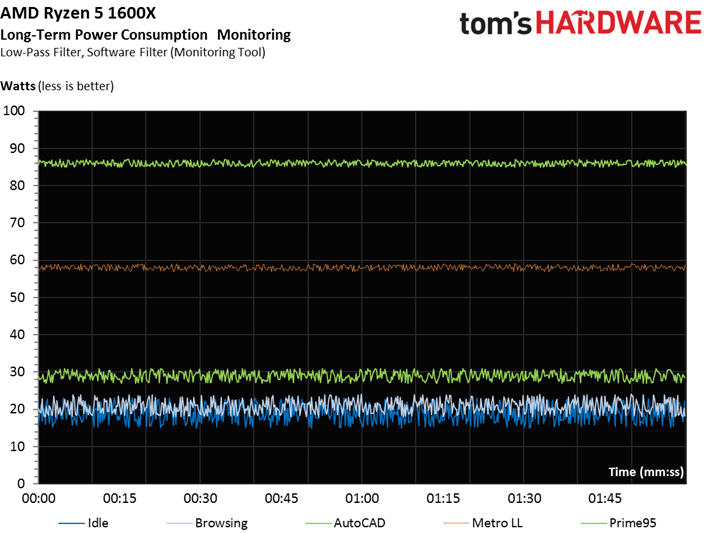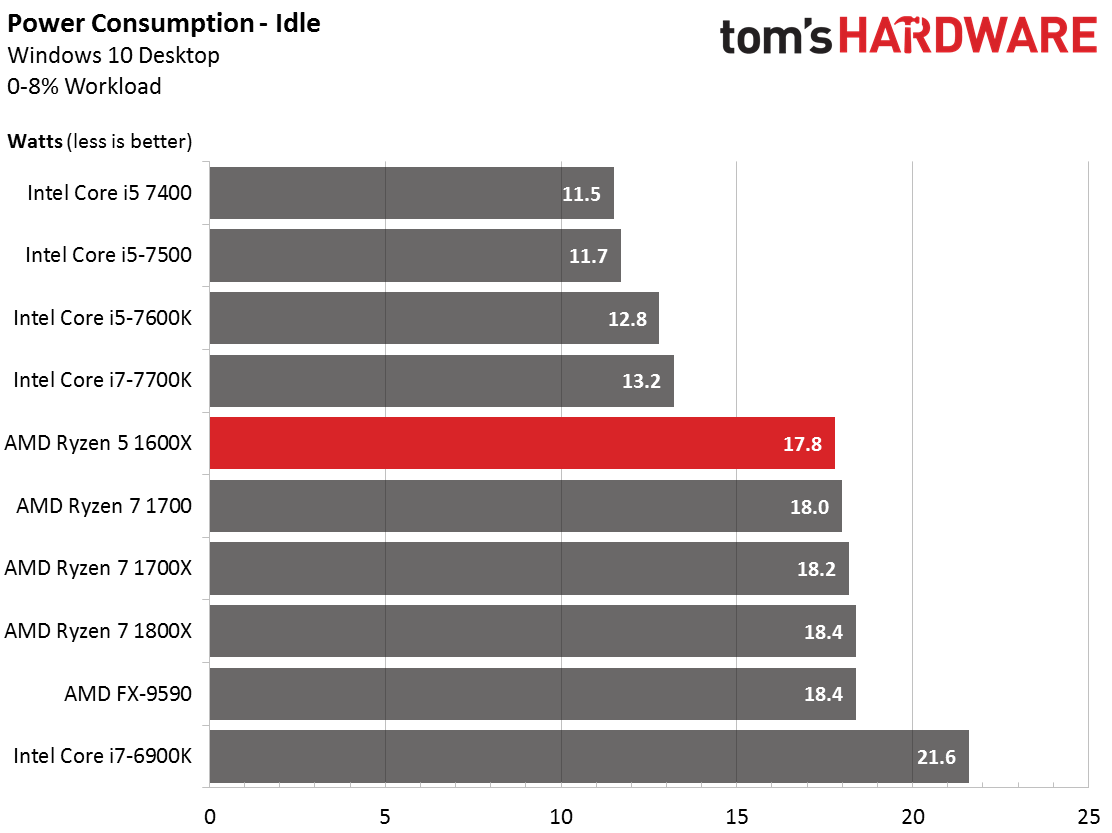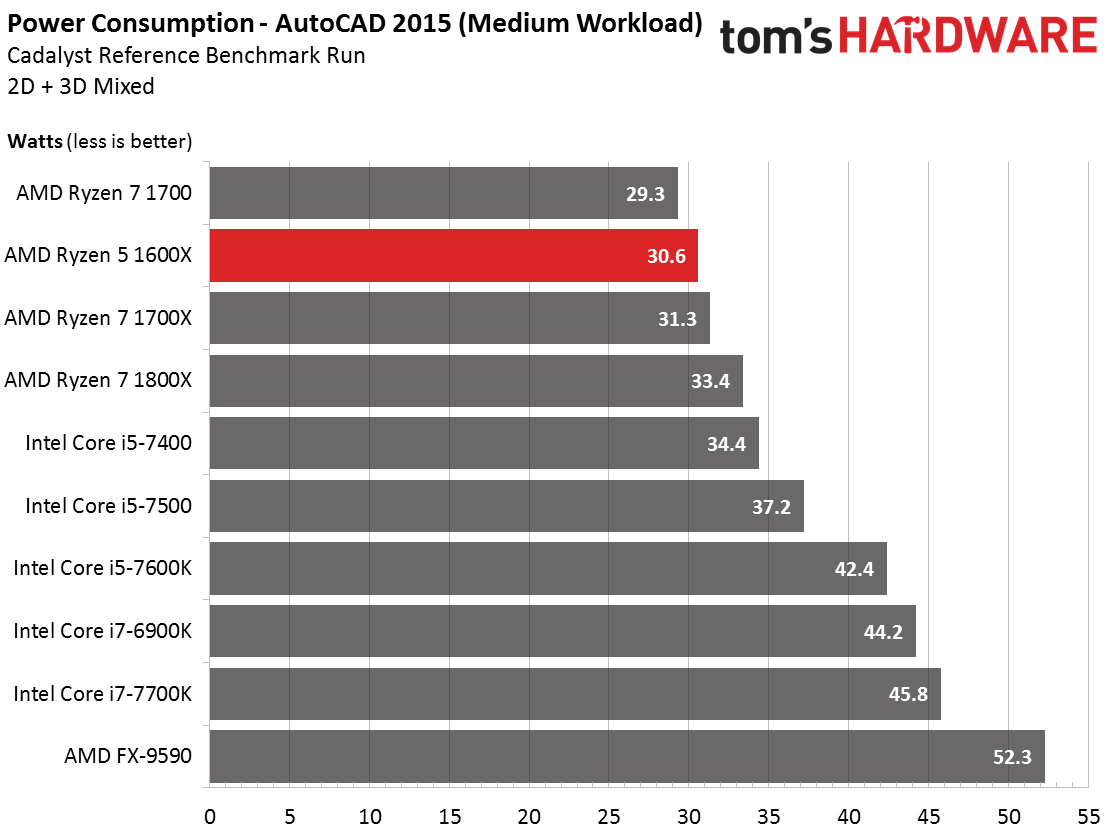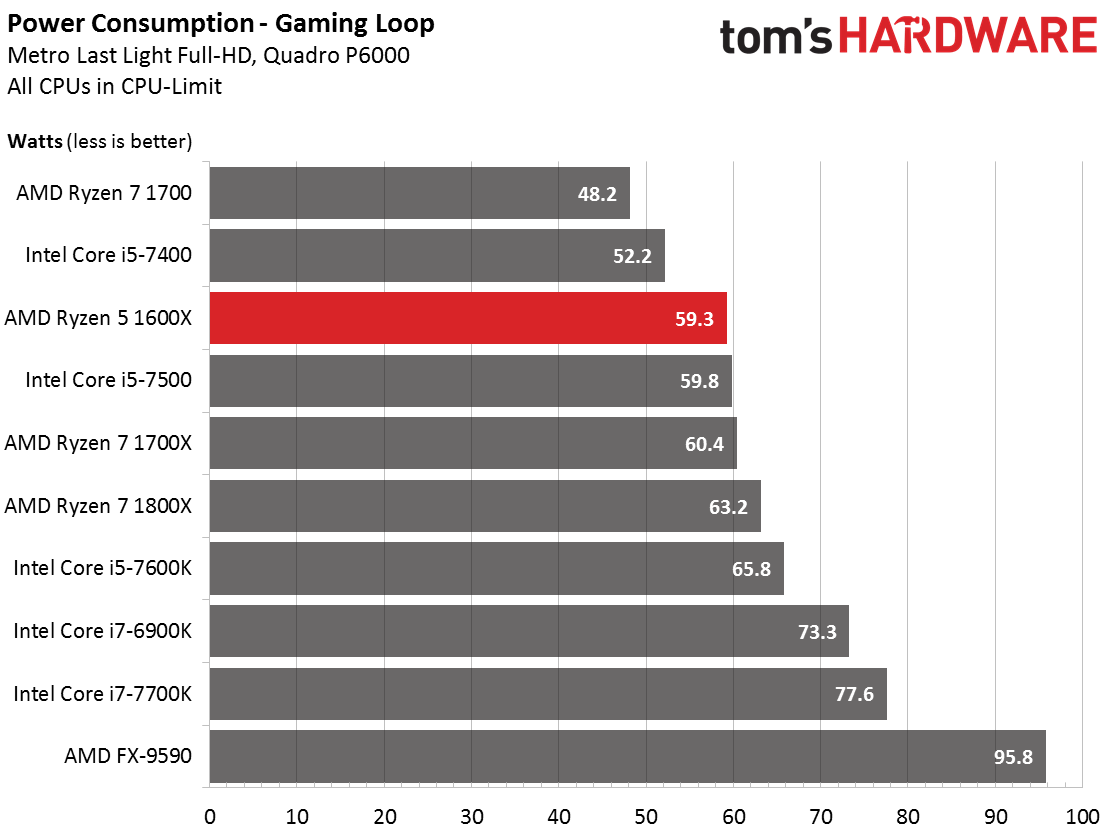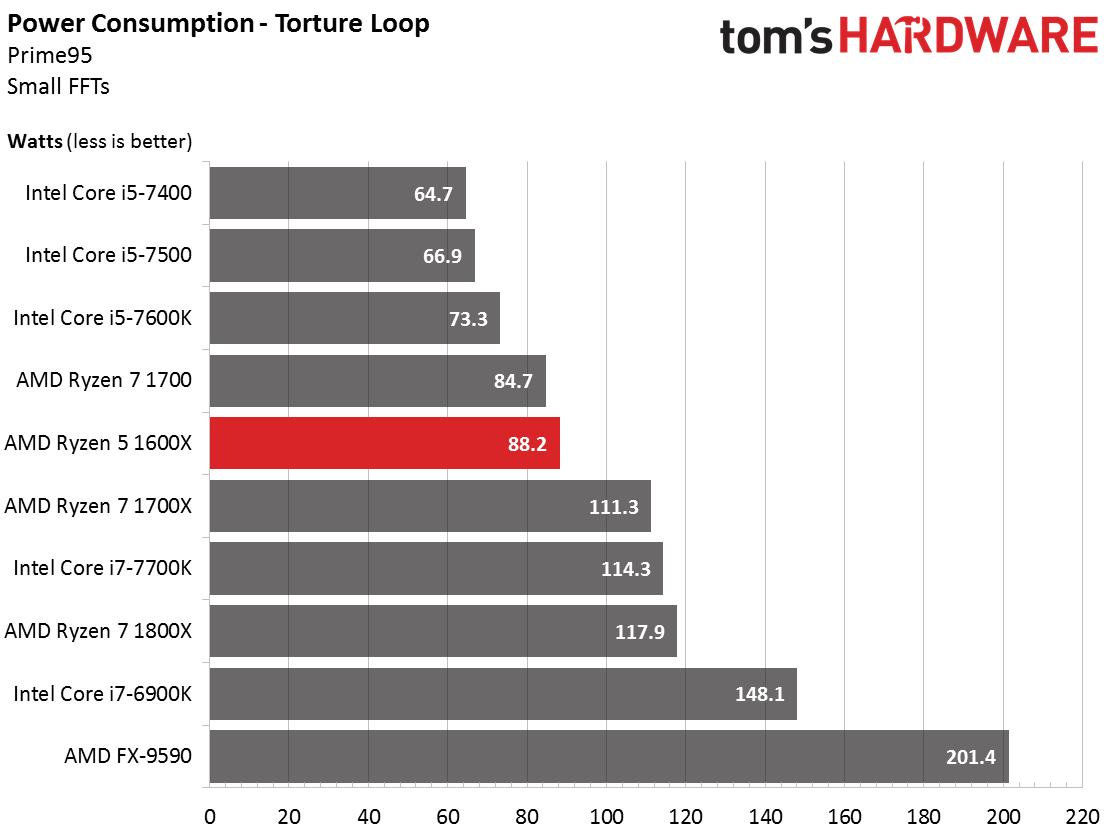AMD Ryzen 5 1600X CPU Review
Why you can trust Tom's Hardware
Power Consumption Results
Important Preamble
In addition to AMD's new Ryzen 5 processors, we also tested the Ryzen 7s once more, given a number of platform changes, the Windows 10 Creators Update, and new drivers. This means the results from our Ryzen 5 review aren't comparable to what we presented in the Ryzen 7 launch story. Fortunately, the differences are very small.
The power consumption results are based on numbers provided by the MSI motherboard’s power supply sensors. We used a special low-pass filter that eliminates brief peaks and valleys, as well as an adjusted average calculation method. The individual clips last only two minutes, but the bar graphs are based on the full 15-minute tests needed for an accurate measurement.
Power Consumption Comparison: Ryzen 5 Processors
The data we're presenting is the result of lengthy test intervals. These are necessary to avoid (or at least minimize) sporadic measurement errors and the influence of unwanted fluctuations.
The findings get interesting once the cores are stressed with a higher load. Power consumption goes up significantly, and there’s a large difference by the time we hit the stress test.
Power Consumption Comparison: All Processors
The following chart includes all of the Ryzen models we've reviewed thus far at idle. The differences between them are very small. In fact, they can only be measured reliably with a 15-minute test run.
AMD's six- and eight-core models demonstrate similar power characteristics. Because there's really no difference between them, we can only assume that the CPUs with disabled cores didn't have them cut off electrically. As a result, they're still being supplied with power.
It’s anyone’s guess at this point whether it'll ever be possible to activate disabled cores/cache against AMD's wishes. More than likely, though, the company took pains to prevent that kind of modding.
Get Tom's Hardware's best news and in-depth reviews, straight to your inbox.
Even though AutoCAD is predominantly single-threaded, the differences between Ryzen processors prove to be marginal once again. They are probably attributable to variations in chip quality and clock rate more than anything else.
Under heavier loads, the larger Ryzen models are left behind. AMD’s Ryzen 7 1700 comes closest to the architecture's sweet spot due to its lower clock rate.
A similar picture emerges during the stress test. AMD’s Ryzen 7 1700 with its 16 threads and low frequency beats the 6C/12T Ryzen 5 1600X.
What we’ve found in our Ryzen 5 tests fits in well with what we’ve known and suspected based on our previous experiences with AMD’s Ryzen 7 processors. Mainly, the Ryzen 5s aren’t any more or less efficient than the eight-core variants. This leads us to two conclusions. First, the Ryzen 5's die quality isn't any worse than what you get from Ryzen 7, and it doesn’t negatively impact efficiency or drive up power consumption. Second, disabling cores to yield a Ryzen 5 doesn’t result in better efficiency, which makes it highly likely that these deactivated parts are still supplied with power.
The power consumption results across all of AMD's Ryzen processor models are solid compared to Intel's equivalent CPUs, except at idle. AMD’s efficiency really isn’t any worse than Intel's, provided that you present Ryzen with a threaded workload able to fully utilize the architecture.
MORE: Best CPUs
MORE: Intel & AMD Processor Hierarchy
MORE: All CPU Content
Current page: Power Consumption Results
Prev Page Temperatures And Many Questions Next Page Workstation Benchmarks
Paul Alcorn is the Editor-in-Chief for Tom's Hardware US. He also writes news and reviews on CPUs, storage, and enterprise hardware.
-
ninja_warrior If you can reliably overclock any of the ryzen 5/7 to 4.0, why would you get the 1600x over the 1700? Comparing a 1600x at 4.0 to a 1700 at 3.0 and then concluding that it's a better CPU when the 1700 can overclock exactly the same seems pretty stupidReply -
bloodroses A little disappointing for the Ryzen 5's imo. You'd think with the reduced core count you'd get better frequencies (and OC'ing) than what you get with the Ryzen 7.Reply
I honestly don't see a reason why to get a Ryzen 5 at this point since the i5 is definitely better for gaming and the Ryzen 7 is better for workstation use. The price alone takes it out of its own market. -
tamban A CPU review with only gaming benchmarks? Tom's hardware really likes Intel's hardware.Reply -
FormatC Reply
Try page 10 :P19547998 said:A CPU review with only gaming benchmarks? Tom's hardware really likes Intel's hardware.
31(!) Workstation benchmarks. Too less?
-
Oranthal How about a real world test where you play a game and run a 1080p stream then compare performance? How about 1440p? How about broadening the scope of testing? Nah just ignore the strength of more cores and focus on single thread work and a few games.Reply -
irish_adam you say that the i5 7600k comes out on top at stock but just on the gaming benchmarks i make it 4-4 with 2 draws. I wouldnt say that it came out on top at all. I would say they are pretty evenly matched at the moment. Also apart from the odd couple from both sides their frame difference was less than 10, at over 100FPS i'd pay good money that no one would be able to distinguish a difference between either system.Reply -
elbert Great review Paul and Igor. Best review I have seen given its the only review with 2 intel cpu's in the price range of Ryzen 5. The RAM info is great which shows that Ryzen gains a real 9ns latency advantage using higher clocked RAM on the Ryzen 5. Given the Ryzen 7 has less cache per core I would expect that gain to be higher.Reply
An issue that does stick out here is high price of the overclocking solution. How does the 7600k fair with a stock intel heatsink compared to the 1600x wraith spiral best overclocks? I think Ryzen has a real price advantage given the cooler required for a reasonable overclock.
Also how does the 7600K compare in games while twitch streaming against the 1600X? -
dstarr3 Reply19548037 said:How about a real world test where you play a game and run a 1080p stream then compare performance? How about 1440p? How about broadening the scope of testing? Nah just ignore the strength of more cores and focus on single thread work and a few games.
Maybe that's your real-world test, but that isn't mine. And am I the only one that can see the workstation benchmarks on page 10? Everyone seems to be ignoring them and then complaining that they aren't there.
